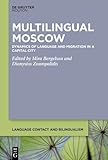Multilingual Moscow : Dynamics of Language and Migration in a Capital City / ed. by Dionysios Zoumpalidis, Mira Bergelson.
Material type: TextSeries: Language Contact and Bilingualism [LCB] ; 22Publisher: Berlin ; Boston : De Gruyter Mouton, [2024]Copyright date: 2024Description: 1 online resource (XI, 188 p.)Content type:
TextSeries: Language Contact and Bilingualism [LCB] ; 22Publisher: Berlin ; Boston : De Gruyter Mouton, [2024]Copyright date: 2024Description: 1 online resource (XI, 188 p.)Content type: - 9783110751116
- 9783110751253
- 9783110751215
- online - DeGruyter
- Issued also in print.
| Item type | Current library | Call number | URL | Status | Notes | Barcode | |
|---|---|---|---|---|---|---|---|
 eBook
eBook
|
Biblioteca "Angelicum" Pont. Univ. S.Tommaso d'Aquino Nuvola online | online - DeGruyter (Browse shelf(Opens below)) | Online access | Not for loan (Accesso limitato) | Accesso per gli utenti autorizzati / Access for authorized users | (dgr)9783110751215 |
Frontmatter -- Contents -- List of figures -- List of tables -- List of maps -- Introduction -- 1 Language policy dynamics in metropolitan Moscow, education and linguistic landscape -- 2 Internal migration and language maintenance in Moscow -- 3 Multidirectional initiatives in micro-level language planning: Educational projects for migrants in Moscow -- 4 Language practices at the micro-level: The case of a multicultural school in Moscow -- 5 Narratives of linguistic adaptation: Values of multilingual Moscow residents -- 6 Family language policy in the Circassian community in Moscow -- 7 The Mari community of Moscow: Ethnic language maintenance in urban settings -- 8 Russian Germans as an ethno-linguistic community: Historical development and current state of the youth age group in Moscow -- 9 Concluding remarks and the future of the Languages of Moscow -- Index
restricted access online access with authorization star
http://purl.org/coar/access_right/c_16ec
Moscow is one of the largest cities in Europe. Over the last three decades, the linguistic, cultural, and religious diversity in the Russian mega-city has increased substantially. On the other hand, language policy and language situation received little or no academic attention. The collection is closing this gap in the literature and investigates the urban multilingual practices in Moscow. A particular focus is placed on the investigation of multimodal interactions within minority groups. Ideologies about language play an important role in how communities form and differentiate themselves from others. Interestingly, the book unearths significant ideological views held about language varieties spoken in Moscow. The collection offers interdisciplinary contributions from areas such as education, intercultural communication, migration studies, geography, ethnography of communication, and community practitioners. In sum, the reader benefits from an insightful introduction to the complex linguistic situation in the dynamic capital of Russia.
Issued also in print.
Mode of access: Internet via World Wide Web.
In English.
Description based on online resource; title from PDF title page (publisher's Web site, viewed 20. Nov 2024)


